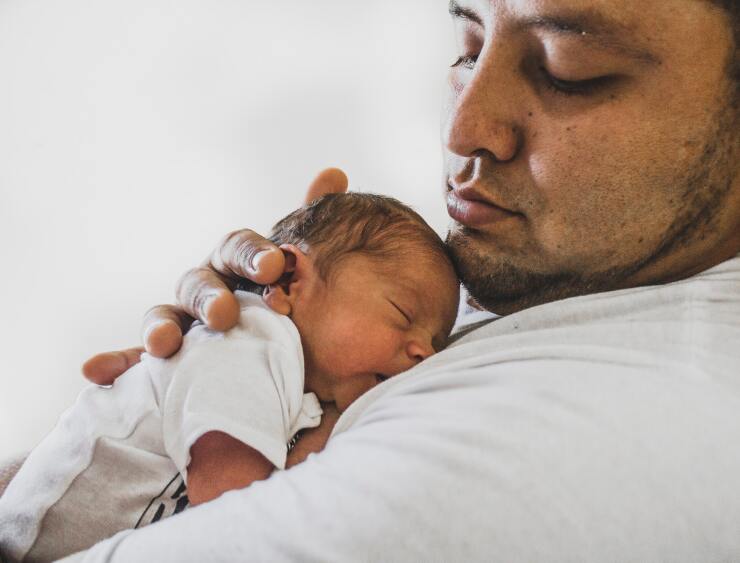While many employers and benefits companies have turned their attention to the needs of working mothers, working dads often find themselves excluded from the caregiver conversation — and some fathers have had enough.
Brian Anderson, a father of two daughters, recalls feeling lost when his first child was born eight years ago. In his professional and personal life, Anderson struggled to feel seen as a dad who wanted a deep connection with his children rather than just the assumed 'breadwinner.'
"My wife had all these different communities, but when I looked around I couldn't find any dad communities rooted in gender equity and progressive thinking," says Anderson. "So I built my own."
Read more:
Anderson, alongside his neighbors, friends and co-workers, started meeting monthly to discuss their experiences, advise one another and create a space for them to explore fatherhood. From a group of 50 friends to over 125,000 dads worldwide, these meetings grew into Fathering Together, a non-profit organization that offers educational resources as well as in-person and online communities centered around
This fall, Anderson, who is the co-founder and executive director of Fathering Together, is bringing his organization's resources to hospitals, schools and companies. Anderson wants to build in-person fatherhood groups starting from pregnancy to the infamous teen years. He hopes the groups will help dads feel comfortable expressing themselves as caregivers — an identity many men are not encouraged to embrace.
A 2021 report by
"There's this narrative that men work and women don't when children come along," says Anderson. "Even my wife and I fell into that rhythm, but we caught ourselves and decided that's not what we want to model for our children."
The prevailing notion that men do not share caregiving responsibilities can be harmful to families as a whole. And Anderson notes that this stigma has made it difficult for Fathering Together to help employers establish employee resource groups for dads in the past. In fact, none of the ERGs lasted very long, but Anderson is not giving up. For him, there's too much at stake.
Read more:
Blessing Adesiyan, founder and CEO of caregiving benefits provider Mother Honestly, couldn't agree more.
"There is the assumption that men do not value care, and this carries across from the home to the workplace," she says. "Men are often excluded from the conversation around support for working mothers. This has a huge effect on working mothers because it essentially signals that care is a women's issue."
Adesiyan notes that employers' failure to encourage working fathers to take adequate leave, access care stipends and child care coaching or join ERGs and workshops has only pushed more women out of the workforce as child care falls solely on their shoulders. It's no wonder roughly 3.5 million moms left the workforce during the pandemic, according to the Census Bureau. For many moms, it seemed as if society and their company culture expected them to leave, says Adesiyan.
On other hand, it seems as if dads are expected to put caregiving out of sight and out of mind, Anderson says.
"I can't tell you how many dads I've spoken to tell me that they are the emergency contact at their kid's school, and their wife still gets the call before they do," says Anderson. "Or they get promoted but are afraid of giving up little league coaching or the ability to pick up their kids from school. Schools and companies need to understand that dads can be parents too."
Read more:
Adesiyan believes that employers are key to including dads in the caregiving conversation. If companies articulate their support for fatherhood within their benefits, leave policies and leadership training, it will start to change the gendered expectations surrounding child care for the better, she says
"Employers should create opportunities for fathers in the workplace to flourish in their responsibilities at home," says Adesiyan. "This includes offering an equal amount of paid parental leave, providing substantial childcare solutions and finally providing a forum for these conversations around care to be mainstream."
Anderson knows firsthand what a difference a local community of dads makes — and knows that if more working dads saw their colleagues and managers clocking out early to see their kid's game, go to a doctor's appointment, or even just sit at home and watch a movie with their kids, more dads would feel empowered to do the same.
Read more:
"Your child doesn't care if you made seven figures in sales that year — this is about helping dads recognize that your kid just wants you around," says Anderson. "So we provide dads an opportunity to lean on one another, gain parenting skills and be present and accountable at home."
Platforms like Fathering Together and Mother Honestly could help employers build equitable caregiving benefits, but ultimately employers will have to decide if they can afford to ignore gaps in their policies at risk of high turnover and excessive hiring costs. But both Adesiyan and Anderson agree that if the caregiving conversation does not include dads, they have already failed moms and children.
"You can't change the narratives of women without changing the narratives of men," says Anderson. "So let's tackle masculinity and patriarchal privileges and meet women in the middle."






